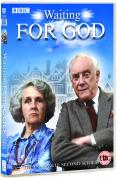![The Life and Adventures of Nicholas Nickleby [1982]](/pictures/1032220.jpg) The Life and Adventures of Nicholas Nickleby | DVD | (24/11/2003)
from £N/A
| Saving you £N/A (N/A%)
| RRP
The Life and Adventures of Nicholas Nickleby | DVD | (24/11/2003)
from £N/A
| Saving you £N/A (N/A%)
| RRP This Nicholas Nickleby is not one of Hollywood's condensed versions, it's the Royal Shakespeare Company's epic eight-and-a-half-hour adaptation of the life and times of the eponymous school-teacher. The 1982 production (originally staged in two parts) won worldwide acclaim and was such a success that Britain's then-newest TV station, Channel 4, launched a joint venture with independent production company Primetime to bring Nicholas Nickleby to a television audience. The result is this wonderfully theatrical version, filmed at the Old Vic and starring much of the original stage cast. It manages to stay true to Trevor Nunn's original artistic vision of Dickens's damning incitement of England's educational system. The ensemble cast are superb: Roger Rees as Nicholas is a bright-eyed idealist, every inch the young romantic hero whose principles are often his downfall, but ultimately his salvation; Fulton Mackay's twisted, embittered Squeers is every inch the Dickensian villain; and David Threlfall is transformed as Smike, Squeers' piteously subjugated, crippled servant and gives the most moving performances of his career. This enthralling TV adaptation recreates the magic of the stage version for all those who were unable to catch it on its pitifully short run. It doesn't pull any punches as the humour and inspiring storyline are tempered with real dark and tragic episodes. Forget the Hollywood fluff, this is the version you should watch if you want a faithful retelling of Dickens's story. --Kristen Bowditch
 Waiting For God - Series 2 | DVD | (15/05/2006)
from £6.95
| Saving you £13.04 (187.63%)
| RRP
Waiting For God - Series 2 | DVD | (15/05/2006)
from £6.95
| Saving you £13.04 (187.63%)
| RRP 'If you're angry you know you're still alive!' The complete second series of the fondly remembered BBC sitcom Waiting for God. Episodes Comprise: 1. Counselling For The Dying 2. The Partition 3. Daisy Takes Charge 4. The Thief 5. Tell The Truth 6. The Hip Operation 7. Glamorous Grannies 8. Foreign Workers 9. Young People
![A Night To Remember [1958]](/pictures/1013409.jpg) A Night To Remember | DVD | (19/06/2007)
from £6.29
| Saving you £13.70 (217.81%)
| RRP
A Night To Remember | DVD | (19/06/2007)
from £6.29
| Saving you £13.70 (217.81%)
| RRP Two years after 20th Century Fox released its melodramatic disaster film Titanic in 1953, Walter Lord's meticulously researched book A Night to Remember surprised its publishers by becoming a phenomenal bestseller. Lord had an intuition that readers craved the reality of the Titanic disaster and not the romantically mythologised translations (like Fox's film, starring Barbara Stanwyck), which relied on fictional characters to "enhance" the world's worst maritime disaster. Lord's book proved that the truth was far more compelling than fiction, outlining the many "if onlys" (if only the iceberg had been spotted a few minutes earlier, etc.) that lent sombre irony to the loss of 1,500 Titanic passengers. Three years after Lord's book appeared, it was brought to the screen with the kind of riveting authenticity that Lord had insisted upon in his own research. The 1958 British production of A Night to Remember remains a definitive dramatization of the disaster, adhering to the known facts of the time and achieving a documentary-like immediacy that matches (and in some ways surpasses) the James Cameron epic released 39 years later. The film erroneously perpetuates the once-common belief that the Titanic sunk in one piece (instead of breaking in half as its bow began to plunge), but many other misconceptions are accurately corrected, and the intelligent screenplay by thriller master Eric Ambler is a model of factual suspense. By making Titanic the star of the film, director Roy Baker emphasises the excessive confidence of the booming industrial age and creates an intense you-are-there realism that pays tribute to Walter Lord's tenacious quest for truth. --Jeff Shannon
 Midsomer Murders - Talent For Life | DVD | (11/04/2005)
from £4.90
| Saving you £12.09 (246.73%)
| RRP
Midsomer Murders - Talent For Life | DVD | (11/04/2005)
from £4.90
| Saving you £12.09 (246.73%)
| RRP In Malham Bridge former socialite and feisty pensioner Isobel Hewitt is accused of assault by fellow fly fisher Margaret Seagrove. When Barnaby and Troy investigate the allegations they discover that all is not well on the Midsomer riverbanks. The investigation takes a more serious turn when two bodies are discovered in the river. Are they the victims of an uncalculated attack by poachers or was there a more sinister motive?

Please wait. Loading...
This site uses cookies.
More details in our privacy policy